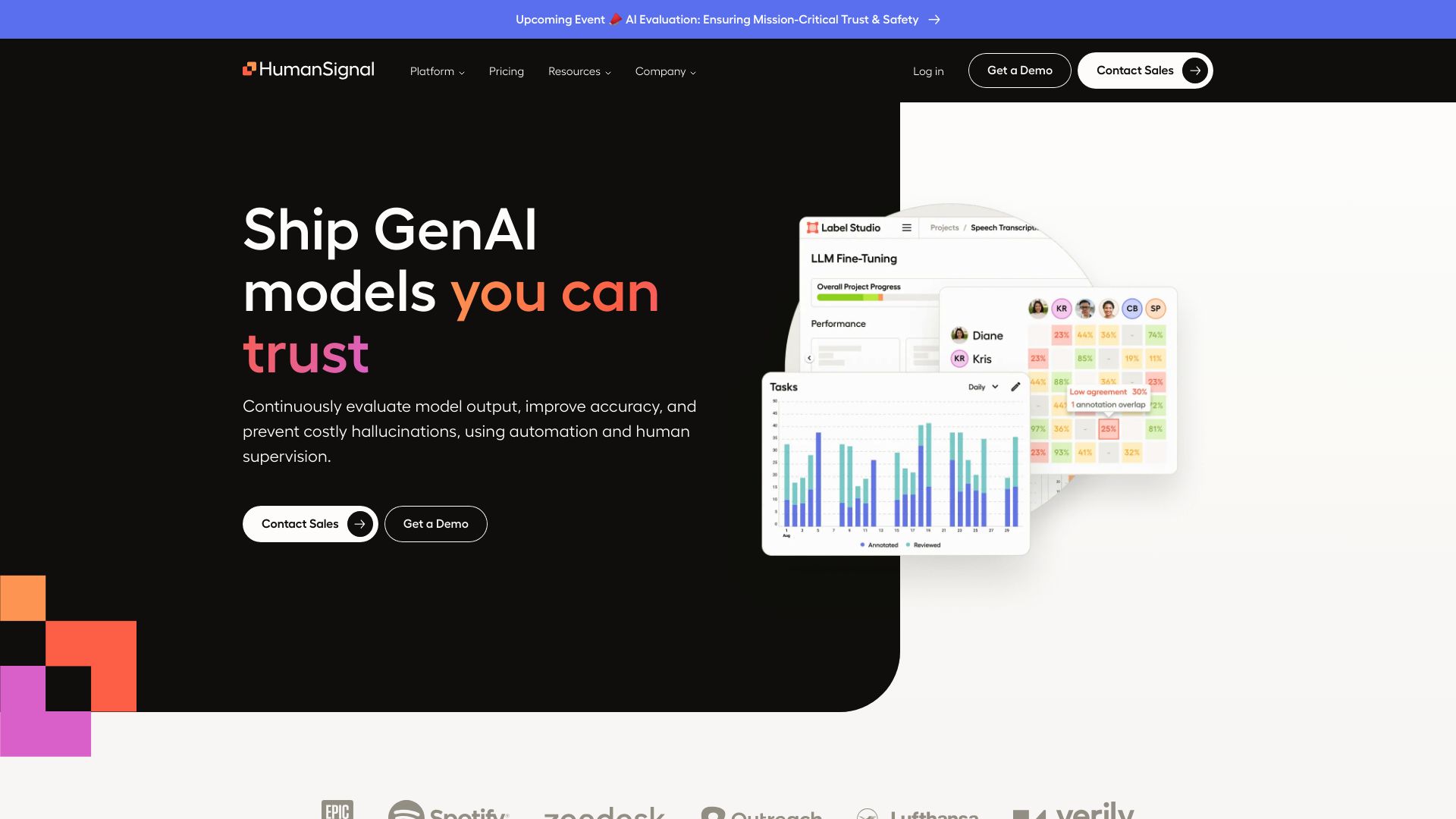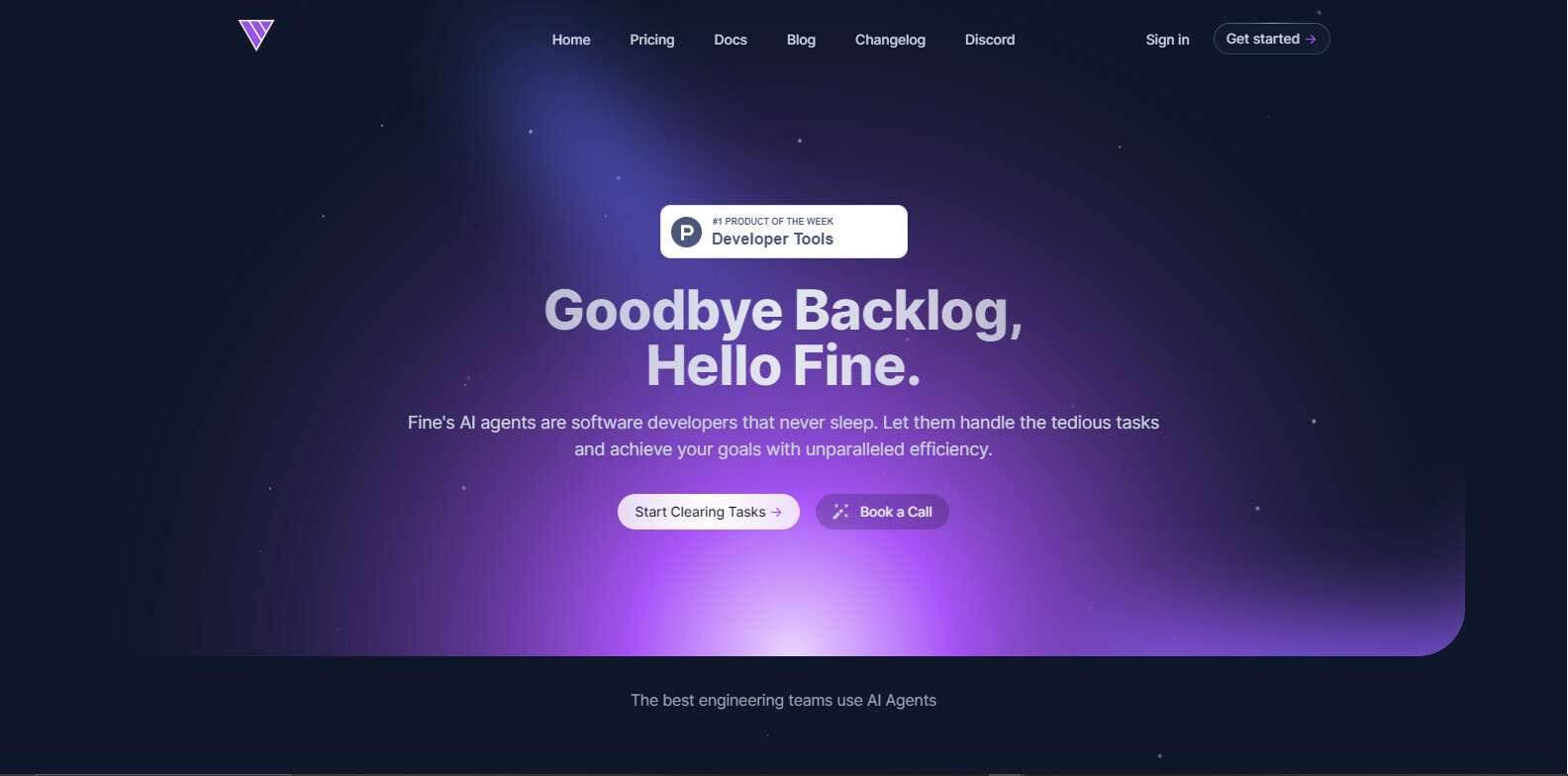Adala vs. Fine AI: Specialized AI Solutions Compared
AI platforms reshape how businesses leverage intelligent automation, with tools like Adala for data labeling and Fine AI for software development gaining traction. This comparison explores these specialized solutions alongside SmythOS, a versatile AI development platform.
We examine each platform’s core strengths, feature sets, and target audiences, highlighting how they address key challenges in AI implementation. From Adala’s focus on autonomous data labeling to Fine AI’s streamlined coding workflows and SmythOS’s comprehensive approach, this analysis equips readers to make informed decisions about which AI solution best fits their unique needs and technical requirements.
Adala Overview
Adala revolutionizes data labeling with its open-source framework for building autonomous AI agents. This innovative platform empowers developers to create, train, and manage intelligent agents capable of performing complex data labeling tasks with remarkable efficiency and accuracy.


Adala’s core strength lies in its utilization of large language models (LLMs) as the runtime for its agents. This approach enables the creation of specialized agents with skills in text classification, summarization, and question-answering. The platform’s modular architecture fosters extensibility, allowing users to develop and integrate custom skills tailored to specific data labeling requirements.
Adala’s core strength lies in its utilization of large language models (LLMs) as the runtime for its agents… enabling the creation of specialized agents with skills in text classification, summarization, and question-answering.
A key feature of Adala is its emphasis on continuous improvement through human feedback. Agents can request input on their predictions, creating a tight feedback loop that enhances reliability and accuracy over time. This human-in-the-loop approach ensures high-quality results while potentially reducing the overall cost and time investment in data labeling projects.
Adala… emphasizes continuous improvement through human feedback. Agents can request input on their predictions, creating a tight feedback loop that enhances reliability and accuracy over time.
While Adala offers powerful capabilities for autonomous data labeling, it may present a steeper learning curve for non-technical users. The platform primarily caters to developers and data scientists comfortable with code-based interactions and API integrations. Additionally, Adala’s focus on data labeling may limit its applicability for users seeking more general-purpose AI agent solutions.
Fine AI Overview
Fine AI empowers developers to create customized AI agents that automate software development tasks. The platform specializes in generating code, managing APIs, and running migrations, streamlining the development process for backend, frontend, and testing workflows.
Fine AI’s agents excel at understanding specifications and implementing coherent changes across codebases. The platform facilitates collaboration by enabling teams to share and reuse agents, fostering a more efficient development ecosystem. Interactive previews allow developers to visually test code changes, reducing errors and speeding up the iteration process.
Fine AI empowers developers to create customized AI agents that automate software development tasks. The platform specializes in generating code, managing APIs, and running migrations…


Fine AI aims to reinvent the developer workflow by eliminating repetitive tasks, allowing engineers to focus on complex problem-solving. The platform’s agent delegation model boosts productivity while promoting human-AI collaboration for collective problem-solving. Fine AI’s vision centers on restoring the joy of building software by automating tedious coding tasks.
Fine AI aims to reinvent the developer workflow by eliminating repetitive tasks, allowing engineers to focus on complex problem-solving.
Currently in public beta, Fine AI offers a desktop application for configuring workflows and agents, a library of ready-made agents for common tasks, and the ability to run agents locally on repositories. The platform also provides notebooks for authoring technical specifications, giving developers a comprehensive toolkit for AI-assisted development.
Fine AI’s key differentiator lies in its focus on tailored agents aligned to specific technology stacks, rather than general-purpose assistants. This approach positions Fine AI as a transformative tool for optimizing the developer inner loop through intelligent automation.
Feature Comparison
Adala vs. Fine AI offer distinct approaches to AI agent development, with notable differences in their core components and security features. Adala focuses on autonomous data labeling agents, utilizing large language models as the runtime for specialized skills like text classification and summarization. Its modular architecture allows for extensibility, but lacks a visual builder or no-code editor. Fine AI, in contrast, specializes in code generation and software development automation, providing interactive previews and a desktop application for configuring workflows.
In terms of security, Adala emphasizes reliable and trustworthy AI agents, implying a focus on explainability and transparency. However, it lacks explicit features for data encryption, OAuth, or IP control. Fine AI’s security features are not prominently highlighted, leaving potential gaps in areas like data protection and access control.
SmythOS stands out by offering a comprehensive suite of features addressing both core functionality and security concerns. Unlike Adala and Fine AI, SmythOS provides a visual builder and no-code options, making AI development accessible to a broader audience. It also excels in security, offering data encryption, OAuth integration, and IP control — critical features missing from both Adala and Fine AI. SmythOS’s multimodal capabilities and extensive deployment options further distinguish it from the more specialized focus of Adala and Fine AI.
| Adala | Fine AI | SmythOS | |
|---|---|---|---|
| CORE FEATURES | |||
| Hosted Agents (Dev, Production) | ❌ | ❌ | ✅ |
| Environments (Dev, Production) | ✅ | ❌ | ✅ |
| Visual Builder | ❌ | ❌ | ✅ |
| No-Code Options | ❌ | ❌ | ✅ |
| Explainability & Transparency | ✅ | ❌ | ✅ |
| Debug Tools | ❌ | ❌ | ✅ |
| Multimodal | ❌ | ❌ | ✅ |
| Multi-Agent Collaboration | ❌ | ❌ | ✅ |
| Audit Logs for Analytics | ❌ | ❌ | ✅ |
| SECURITY | |||
| Constrained Alignment | ✅ | ❌ | ✅ |
| Data Encryption | ❌ | ❌ | ✅ |
| OAuth | ❌ | ❌ | ✅ |
| IP Control | ❌ | ❌ | ✅ |
| COMPONENTS | |||
| Foundation AIs | ✅ | ❌ | ✅ |
| Huggingface AIs | ❌ | ❌ | ✅ |
| Zapier APIs | ❌ | ❌ | ✅ |
| All other APIs, RPA | ❌ | ❌ | ✅ |
| Classifiers | ✅ | ❌ | ✅ |
| Logic | ✅ | ❌ | ✅ |
| Data Lakes | ❌ | ❌ | ✅ |
| DEPLOYMENT OPTIONS (EMBODIMENTS) | |||
| Deploy as API | ✅ | ❌ | ✅ |
| Deploy as Webhook | ❌ | ❌ | ✅ |
| Staging Domains | ❌ | ❌ | ✅ |
| Production Domains | ❌ | ❌ | ✅ |
| API Authentication (OAuth + Key) | ❌ | ❌ | ✅ |
| Deploy as Site Chat | ❌ | ❌ | ✅ |
| Deploy as Scheduled Agent | ❌ | ❌ | ✅ |
| Deploy as GPT | ✅ | ❌ | ✅ |
| Scalability | ✅ | ❌ | ✅ |
| DATA LAKE SUPPORT | |||
| Hosted Vector Database | ✅ | ❌ | ✅ |
| Sitemap Crawler | ❌ | ❌ | ✅ |
| YouTube Transcript Crawler | ❌ | ✅ | |
| URL Crawler | ❌ | ❌ | ✅ |
| PDF Support | ❌ | ❌ | ✅ |
| Word File Support | ❌ | ❌ | ✅ |
| TXT File Support | ❌ | ❌ | ✅ |
Best Alternative to Adala and Fine AI
SmythOS stands out as the superior alternative to Adala and Fine AI for AI agent development and deployment. Our platform offers a comprehensive solution that addresses the limitations of both competitors while providing unparalleled flexibility and ease of use.
Unlike Adala’s focus on data labeling and Fine AI’s emphasis on code generation, SmythOS delivers a versatile AI operating system capable of creating and managing a wide range of AI agents. We provide a robust drag-and-drop interface that simplifies complex AI workflows, making advanced AI functionalities accessible to users with varying levels of technical expertise.
SmythOS delivers a versatile AI operating system capable of creating and managing a wide range of AI agents.
Our platform excels in areas where Adala and Fine AI fall short. While they lack visual builders and no-code options, SmythOS offers an intuitive design environment that democratizes AI development. This allows businesses to create sophisticated AI solutions without extensive coding knowledge, significantly reducing development time and costs.
Security is a top priority for SmythOS. We implement strong data encryption, OAuth integration, and IP control features — critical components missing from both Adala and Fine AI. This ensures that your AI agents and sensitive data remain protected throughout development and deployment.
SmythOS also outperforms in terms of deployment flexibility. Our platform supports multiple deployment options, including APIs, webhooks, site chat, scheduled agents, and integration with popular AI platforms. This versatility, combined with our extensive pre-built API integrations and templates, enables rapid implementation across various business processes and systems.
SmythOS also outperforms in terms of deployment flexibility… enabling rapid implementation across various business processes and systems.
Conclusion
Adala and Fine AI offer specialized solutions for data labeling and software development automation respectively. Adala’s open-source framework excels in creating autonomous data labeling agents, while Fine AI focuses on streamlining the developer workflow through AI-assisted coding tasks. Both platforms bring unique strengths to their target audiences.
However, SmythOS emerges as the most versatile and comprehensive solution among the three. Our platform combines the strengths of both Adala and Fine AI while offering additional capabilities that address a broader range of use cases. SmythOS’s visual builder and no-code options make AI development accessible to both technical and non-technical users, bridging the gap between specialized tools and general-purpose AI solutions.
SmythOS stands out with its robust security features, including data encryption, OAuth integration, and IP control — critical components missing from both Adala and Fine AI. Our platform’s multimodal capabilities, extensive deployment options, and seamless integrations with over 300,000 tools and services position it as a superior choice for businesses looking to leverage AI across various domains.
We invite you to explore SmythOS and experience the power of our comprehensive AI development platform. Whether you’re a developer, business leader, or AI enthusiast, SmythOS offers the tools and flexibility to bring your AI projects to life. Create your free account today and discover how SmythOS can transform your approach to AI development and deployment.
Last updated:
Disclaimer: The information presented in this article is for general informational purposes only and is provided as is. While we strive to keep the content up-to-date and accurate, we make no representations or warranties of any kind, express or implied, about the completeness, accuracy, reliability, suitability, or availability of the information contained in this article.
Any reliance you place on such information is strictly at your own risk. We reserve the right to make additions, deletions, or modifications to the contents of this article at any time without prior notice.
In no event will we be liable for any loss or damage including without limitation, indirect or consequential loss or damage, or any loss or damage whatsoever arising from loss of data, profits, or any other loss not specified herein arising out of, or in connection with, the use of this article.
Despite our best efforts, this article may contain oversights, errors, or omissions. If you notice any inaccuracies or have concerns about the content, please report them through our content feedback form. Your input helps us maintain the quality and reliability of our information.
